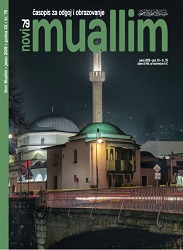NOVI AKTERI U MEĐUNARODNIM ODNOSIMA: RAZLIKA IZMEĐU AL-KAIDE I ISIL-A
NEW PLAYERS IN INTERNATIONAL AFFAIRS: DIFFERENCE BETWEEN AL-QAEDA AND ISIS
Author(s): Mirnes KovačSubject(s): Islam studies, International relations/trade, Studies in violence and power, Radical sociology
Published by: Rijaset Islamske zajednice u Bosni i Hercegovini
Keywords: international relations; terrorism;Al-Qaeda; ISIS; 11th September; Osama bin Laden; Abu Bakr Al-Bagdadi; George W. Bush; jihad; Iraq; Afghanistan; Syria; Saudi Arabia; Sudan; United States of America;
Summary/Abstract: Analysing the new types of transnational terrorist organisations, this article compares Al-Qaeda and ISIS and offers a brief review of the origin and the evolvement of these organisations along with the view of the ways in which these were countered in the last three decades, all in the context of new significant players that have emerged in international relations. International terrorism which Al-Qaeda adopted as its brand name and placed onto the world scene, and was later further developed by ISIS, has had a substantial impact upon the international relations as a disturbing factor and it has itself created new actors and has changed the flows of international economy, traffic, communication, security, in simple words – it had an enormous impact upon the entire world, to such an extent that many authors now take the September 11th as a turning point in the worlds history. The essential difference between Al – Qaeda and ISIS lies in the fact that the first was a net of terrorists and organisations which used the host’s country as the bases for its activities and was managing its activities throughot the world with the assistance, more ideological than practical, of its loyal affiliates; whereas ISIS, after it actually emerged out of the Al – Qaeda, fromed its affilate in Iraq precisely, and broke up with its mother organisation to spread its activities within the war affected territories of Syria and managed to establish a territory, its own population and borders – which for the certain time period gave it traits of a state. Using a historically – comparative method this article takes an analytical view of American and generally world strategies of countering these organisations which, even though beheaded are still not completely annihilated, and it attempts to estimate to what extent the blanders in this, now two decades, mission could bring about creation of fertile ground for an emergence of some new and perhaps even more dangerously reactionary ideologies and terrorist organisations within the areas of conflicts.
Journal: Novi Muallim
- Issue Year: 2019
- Issue No: 79
- Page Range: 81-89
- Page Count: 9
- Language: Bosnian

